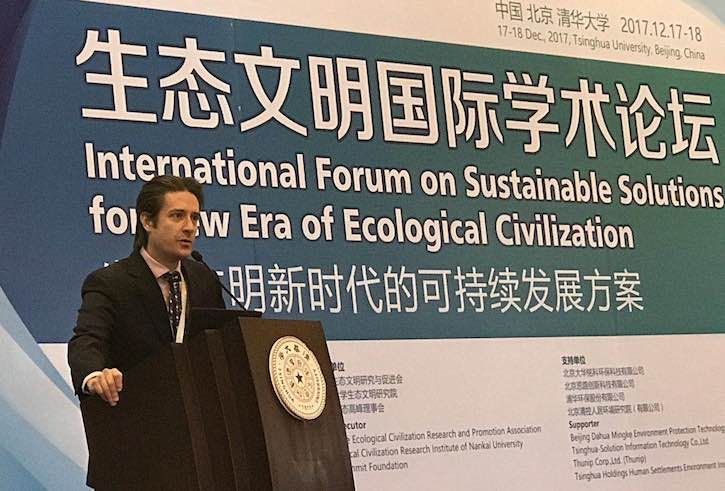
Dietmar Grimm delivered a keynote speech at Tsinghua University’s International Forum on Sustainable Solutions in the New Era for Ecological Civilization on December 17. He highlighted that China has made visionary commitments to ecocivilization through efforts like the dramatic expansion of renewable energy, the development of sponge cities that can use nature to manage drought and flooding, and national park creation to protect China’s natural landscapes. Nevertheless, substantial gaps remain like significant renewable energy curtailment, 60% of China’s natural coastline destroyed via creating cement embankments, and the world far from achieving needed emissions reductions to prevent climate change. Openness and innovation are needed to address the challenges. It is the open flow of ideas, people, funding, products and technology that has helped the world transition from a farm-based to an information-based society, that has grown by billions while making large strides in decreasing poverty and producing goods more sustainably. President Xi Jinping, in his letter to Fortune Forum in Guangzhou in December this year, noted that his intention is that “China will continue to forge global partnerships, expand the common interests with others countries, further liberalize and facilitate trade and investment, and push for an economic globalization that is more open and inclusive, more balanced, more equitable and beneficial to all.” We hope he sticks to those intentions. With such ambition also comes great responsibility in and outside of China to ensure the creation of an ecocivilization, like along the Belt and Road where infrastructure investments pose great economic opportunity though present significant environmental risks. Openness is still “in its early days”, as described by Paulson Institute Chairman Hank Paulson at the Fortune Global Forum. So we need students like those at Tsinghua and around the world to translate the ideas of ecocivilization into action, to develop the transformative technologies needed to address the daunting challenges facing the world, and to get out and help get the work done – or as we at the Paulson Institute like to say: Think and Do 知行合一(zhi xing he yi).





